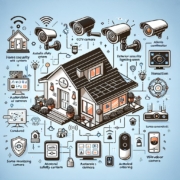The Complete Guide to Safeguarding Your Privacy with Nest Thermostat, Amazon Echo, and Smart Home Devices
The Rise of Smart Home Devices: Balancing Convenience with Privacy
Smart home devices have revolutionized the way we live, offering convenience and efficiency like never before. However, with this convenience comes the looming concern of privacy and security risks that users need to be mindful of in today’s digital age. From voice assistants to smart thermostats and security devices, there are various aspects of privacy that consumers should be cautious about.
Privacy Concerns with Nest Thermostats
Nest thermostats are renowned for their energy-saving features and remote control capabilities. Despite their popularity, there have been growing concerns regarding the privacy of user data collected by these devices. Some potential risks include:
– Data collection: Nest thermostats gather data on users’ temperature preferences, schedules, and usage patterns, which could potentially be used for targeted marketing or shared with third parties without user consent.
– Security vulnerabilities: There is a risk of hackers gaining access to Nest thermostats, potentially exposing users’ daily routines and posing a security threat if exploited.
– Lack of transparency: Users may not fully comprehend the extent of data collection and its utilization, leading to apprehensions about privacy breaches.
Privacy Concerns with Amazon Echo
Amazon Echo stands out as one of the most popular voice assistants available, but it also raises privacy concerns. Key issues include:
– Always listening: Amazon Echo is programmed to listen for its wake word, yet there have been instances where it inadvertently recorded conversations without user permission.
– Data collection: Amazon Echo stores recordings of user interactions, accessible to Amazon for various purposes, sparking worries about the privacy of personal conversations.
– Third-party access: Third-party developers can create skills and apps for Amazon Echo, potentially accessing user data without explicit consent.
Privacy Concerns with Google Home
Google Home, another prevalent voice assistant, has also sparked privacy concerns among users. Key issues include:
– Data collection: Google Home collects data on users’ interactions, including voice commands and search history, for targeted advertising purposes.
– Voice recordings: Google Home retains voice recordings of user interactions, utilized by Google to train its algorithms, raising concerns about the privacy of personal conversations.
– Location tracking: Google Home can track users’ locations for targeted advertising, raising privacy concerns.
Protecting Your Privacy: Practical Tips
While smart home devices offer unparalleled convenience, safeguarding your privacy is paramount. Here are some practical tips to protect your privacy and security:
– Review privacy settings: Adjust the privacy settings on your smart home devices to minimize data collection and sharing.
– Update firmware: Ensure your devices’ firmware is up to date to benefit from the latest security patches and protections.
– Use strong passwords: Set strong, unique passwords for your smart home devices to prevent unauthorized access.
– Disable unnecessary features: Turn off features like voice recording or location tracking to reduce privacy risks.
– Monitor device activity: Keep track of your devices’ activity logs to detect any unusual behavior or unauthorized access.
In Conclusion
while smart home devices offer unparalleled convenience, users must remain vigilant about privacy concerns. By understanding the risks and implementing privacy protection measures, you can enjoy the benefits of smart home technology while safeguarding your personal information. Stay informed, review privacy settings regularly, and adhere to best practices to ensure that your smart home devices are secure and respect your privacy.












Leave a Reply
Want to join the discussion?Feel free to contribute!